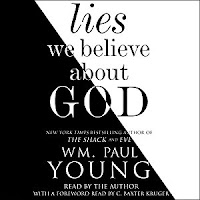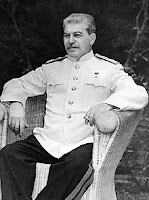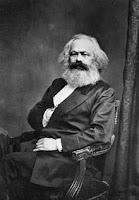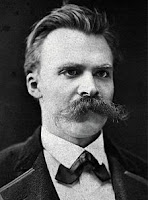Truths We Believe about God, Part 2
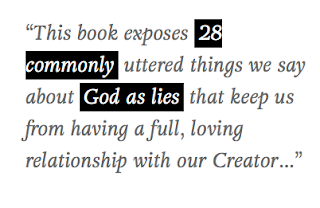 |
| Wm. Paul Young’s website [emphasis in original] |
A Biblical & Theological Rejection** of Wm. Paul Young’s
book, Lies We Believe About God
—The Apostle Peter, 2 Peter 1:20-21
Introduction
William Paul Young’s method of argument in his book Lies we believe about God involves juxtaposing a proof text from
the Bible where it says we are God’s children against the lie he claims
to expose—i.e., not everyone is a child of God.
In short, and as we shall see,
the author forces Scripture to testify against Scripture. Does the
whole of the biblical testimony view all persons to be God’s “children”
and therefore reconciled to Him? This is the question Young raises and
attempts to prove by employing biblical quotations he distorts to say
what he wants them to say. Instead of letting the Bible speak for
itself, he picks and chooses verses he claims say what he wants them to
say. This is called “proof-texting.” Near the end of the book he
demonstrates this method in A Catena, “God’s Drama of Redemption,” where
indiscriminately, he strings together thirty-four Bible passages.
(LWBAG, 241-248)
The Book’s Audience
Note the book’s title, Lies we believe about God. Though he may previously have believed “truths” he now calls “lies,” as the book’s contents indicate, Young no longer believes the lies he claims to expose. The use of the personal pronoun “we” in the title is therefore disingenuous, but designed to get readers to identify with his faith-struggle and reject what he believes are lies about God (Twenty-eight of them!). In other words, he might not be as “one” with all his readers as the use of “we” in the title implies, unless they too believe the lies.
The book’s title might have been like, “Lies you believe about God,” or “Lies I used to believe about God.” But that would have sounded too preachy and judgmental in an evangelical culture addicted to feeling good about everything and believing nothing. No author or publisher wants to alienate potential buyers and readers. Better that he, his editor and publisher adopt a strategy of first connecting with a reading audience, and then seducing them to reject truths the author calls lies, which the pronoun “we” attempts to do. Even though they might not understand the Christian faith as he does, with the title the author wants to lure readers into a “conversation” he hopes will change what they believe.
 |
| https://en.wikipedia.org/wiki/Universalism |
The Book’s Assertion
Young’s Big Lie: Everyone’s a child of God.
By stating one lie that “not everyone is a child of God” (LWBAG, Chapter 24), the author thereby infers the opposite to be true—that because they’re inside with the Tri-Personal God, “everyone’s a child of God.” In a previous chapter (LWBAG, Chapter 13), the author confronts a corollary lie, “You need to get saved.” (He does not like the word saved.) Point blank Young states:
Are you suggesting that everyone is saved? That you believe in universal reconciliation?
That is exactly what I am saying!
This is real good news! (LWBAG, 118)
Perverting the Gospel
To him this gospel of universalism is “real good news”! (Contra 1 Corinthians 15:3-4.) Without exception, Young believes all people are children of God, even an atheist friend who he thinks is a child of God not because he believes in God, but because he’s a loyal family man and lives according to virtues like “Love… Life… Truth” (LWBAG, 204-205).
Oh, by the way, it’s okay to have atheist friends. Admittedly, atheists can live moral lives, and that’s good. But like many nominal Christians, not all do.
We can only wonder why Young employed a moral atheist as an example of universal reconciliation and not one of the grossly immoral atheists who deceived and murdered millions of people, villains who did not live according to “Love… Life… Truth.” Yet according to Young’s paradigm, these villains can be considered, even if they weren’t in this life, to have become or are becoming God’s friends (e.g., Marx, Stalin, Freud, Nietzsche, Shelley, etc.). But such negative examples would obviously insult the consciences of readers (they know these individuals were grossly wrong and beyond the pale of decency). A bad atheist illustration would contradict the point the author strives to make: that a good atheist is a child of God based upon the quality of life he/she lives despite not believing in God and Christ. What about atheists who in this life exhibited no standards of goodness, are they in heaven? If “everyone’s saved” as Young believes, then the answer must be, “Yes!” But such a scenario is biblically, morally and theologically repugnant, an affront to the righteousness in and by which God rules the universe. As the Psalmist declared, “For thou art not a God that hath pleasure in wickedness: neither shall evil dwell with thee” (Emphasis added, Psalm 5:4; see 34:16; Habakkuk 1:13, etc.).
Demons Believe in God
True, believing in God does not make someone a “child” of God or a Christian. Even the demons believe in God and “tremble” (James 2:19). But Young thinks that for his consistent living according to high moral standards (admittedly standards Scripture endorses), the atheist is as much a child of God as any true Christian (Maybe he does exhibit behavior superior to that which some Christians manifest.) But Young advocates this in the face of what the Bible says about atheists: “The fool has said in his heart, ‘There is no God’” (Psalm 14:1, 53:1, 10:4; Compare Romans 1:18-23.). Further, Scripture teaches that per se, people’s lifestyles (i.e., “works”) do not save them and make them right with God (Ephesians 2:8-9; Galatians 2:16, etc.). All of us need grace. The flaw in Young’s convoluted theology of salvation is that he mixes hyper-grace (“everybody’s saved” no matter what) with Law-works (he’s a child of God because lives according to virtues). About such a mixture, the Apostle Paul stated, “Therefore by the deeds of the law there shall no flesh be justified in his sight: for by the law is the knowledge of sin” (Romans 3:20; See Galatians 2:16).
 |
| Wm. Paul Young’s website [emphasis added] |
The Book’s Argument—Against the lie,
“Not everyone is a child of God”: Chapter 24
But as we turn to evaluate this chapter in more detail, Young condescendingly anticipates moans and groans from some of us who dare to put God in a box that excludes a moral atheist from being God’s child via universal reconciliation. (I would respond in part by saying that while God does not reside in a box—He has and does work miracles—He has revealed who He is, how He works and what He asks in a Book, The Bible.) So the author anticipates the protest.
I can hear someone at the back of the room say, “well, everyone is a child of God in the sense that everyone is created by God, but…”
…and now comes the rationalization and justification for creating another box, another way to divide people into categories of value. (LWBAG, 205)
Twisted Scriptures—Chapter 24’s Arguments
To prove that all people are God’s children, whether they might be atheists, happy pagans, ordinary citizens, self-righteous church-goers, murderers, profligates or whomever, whatever or wherever, Young claims to biblically expose the lie commonly and traditionally believed by evangelicals, “Not Everyone is a child of God.” He attempts to prove his truth that “everyone is a child of God” by drawing upon two Scripture passages which he twists to fit his universalistic template of salvation that all humans, past, present and future, are saved by virtue of being God’s “offspring.” Both passages need to be investigated to see whether they teach what Young implies. We begin with the Scripture cited by Young taken from the Apostle Paul’s address to the Athenian intelligentsia on Mars Hill. (LWBAG, 206)
Twisted Text #1
“‘For we also are God’s children.’ Being then the children of God…”
—Acts 17:28-29, NASB (LWBAG, 206)
The Scripture involves a quotation (“For we are indeed his offspring,” KJV; “children,” NASB) borrowed by Paul from a poet/philosopher named Aratus (315-240 BC). Despite the fact that Aratus was referring to the god Zeus and not the God of Scripture, the quote does contain a germ of truth; and that is, any conscious observer of the universe can deduce there is a God who originated the cosmos. After all, creation testifies to God’s existence. “The heavens declare the glory of God; and the firmament sheweth his handywork” (Psalm 19:1, 2-6).
Why personality?
Briefly, the argument for God’s existence from creation might run like this: Something cannot come from nothing. Personality cannot derive from non-personality. Ontologically persons cannot originate from impersonal power(s) like gravity (That’s Stephen Hawking’s view.). As it takes one to know one, so it takes one to make one. So a personal God must have created all persons. Thus, because of the corporate origin of their personalities, human beings are derivatively God’s “offspring” (Greek, genos). By his use of Aratus’ quote this is the point Paul the Apostle made and how he sustained his argument with the Athenian philosophers; by using a source they respected and accepted. He was arguing on their “turf.”
Yet despite that argument, and like Young’s atheist acquaintance mentioned in the chapter, many of those philosophers could not believe in a God who would one day raise people from the dead and judge the world (Acts 17:30-32; Compare John 5:24-29; Jesus said His Father gave the power to raise and judge all the dead to Him.). In short, the philosophers, who were sooner or later headed for their “box” in the ground, did not like the Apostle’s message that one day the resurrection would open it! But for a number of reasons, Young’s implication from the biblical text—that all persons are God’s children—is deceptive. The universalistic inference (because all humans are God’s offspring-children we’re all saved) he draws from Acts 17:28, is not accurate.
Zeus and Elohim
First as has already been noted, the god of the Apostle’s Aratus-quote was Zeus, not Elohim, the Creator-God of the Bible (Genesis 1:1). About the Apostle’s quote of Aratus, John Stott insightfully commented that “glimmerings of truth, insights from general revelation, may be found in non-Christian authors.” Yet Stott warns that “Zeus is emphatically not identical with the living and true God.”[17] (See Romans 1:18-23.) So without any clarification as to the god the quote refers to, Young makes it appear that by virtue of their descent from Zeus all humans are God’s “children.” Go figure…. In Paul Young’s scheme of redemption the god Zeus is evidently interchangeable with the biblical God Elohim who created human life (“Let Us make man in Our image,” Genesis 1:26, NASB).
All humans are all God’s children originally—the genos group
Second, the Greek word (genos) for “children” means “race… [or] the aggregate of many individuals of the same nature, kind, sort.”[18] As to origin, genos views humanity corporately, not individually. That is why the majority of Bible versions translate genos as “offspring” (KJV, NKJV, NRSV, ASV, ESV, NLT, Young’s and Darby). Only two translate genos as “children” (NASB, NCV). The context indicates the Apostle is arguing with the philosophers about humanity’s corporate genos-origin (Acts 17:24-26), not their individual destinies. (This comes a bit later in the Apostle’s sermon, Acts 17:30-31.) Larkin comments that, “Being his offspring refers only to creation, not salvation, as the subsequent call to repentance clearly shows.”[19]
When Paul later called upon the philosophers to repent (Acts 17:30-31), many (but not all) mocked the invitation. Thus, by his use of the word genos the Apostle highlights humanity’s creation by God aggregately (which some of the hearers scoffed at), not human relationships with God individually. Both semantically and contextually, the preferred understanding of the word genos is “offspring” or “kindred,” not “children.” When Paul states to the Athenians that God “hath made of one blood [‘from one man,’ NASB] all nations of men for to dwell on all the face of the earth” (Acts 17:26), does not that in context confirm genos to mean “offspring-group”?
All humans are not all God’s children organically—the huoi and tekna group
Third, in his letters the Apostle Paul uses either “children” (Greek, tekna) or “sons” (Greek, huiois) to describe individuals who by faith have a personal relationship with God (i.e., they stand reconciled to Him). “Therefore being justified by faith, we have peace with God through our Lord Jesus Christ” (Romans 5:1). While all human beings are God’s “offspring” generally, only true believers are considered His “children” (tekna) and/or “sons” (huiois) personally.[20] This may be observed in Paul’s letter to the Romans where he stated,
—Romans 8:14-16
In his Gospel John also differentiated two groups of people based upon whether they received or rejected Jesus Christ. “He came unto his own, and his own received him not [They shunned “relationship” with Jesus.] But as many as received him,” he wrote, “to them gave he power to become the sons (tekna) of God, even to them that believe on his name” (John 1:11-12). According to the Apostle John, some persons received Jesus and were reconciled to Him while others rejected Jesus and were not. No matter how one might want to slant the meaning of this verse, two groups are portrayed, not one. If this is understood as John having created a box, then so be it. It is what it is.
While all humans are God’s children originally (They possess physical life by virtue of being originally created by God.), it does not follow, based upon the New Testament’s teaching, that all are His children organically (They possess spiritual life for reason of being new creations in Christ.). “Except a man be born again [anothen, “from above”], he cannot see the kingdom of God,” Jesus told Nicodemus (John 3:3). We can deduce from Jesus’ words that there are those who by being born from above “see the kingdom of God” and those who are not born from above and therefore are blind to it. The Apostle Paul seconded Jesus’ statement when he wrote, “Therefore, if anyone is in Christ, he is a new creation” (1 Corinthians 5:17, NKJV). The only conclusion that can be derived from these Bible passages and others is that, there are those who are organically God’s children and those who are not.
 |
| Read Warren B. Smith’s insightful article HERE |
The Devil’s in the Details
So Paul Young assumes that because all humanity shares common origin from God, all are therefore God’s children. So let’s observe whether or not the following verses fit Young’s inclusive Father-family template for humanity, that everyone is a child of God.
- “Ye [Jewish leaders] are of your father (pater) the devil”
—John 8:44 - “The spirit that now worketh in the children (huiois) of disobedience”
—Ephesians 2:2 - “[We] were by nature the children (tekna) of wrath, even as others”
—Emphasis added, Ephesians 2:3 - “The man of sin… the son (huios) of perdition”
—2 Thessalonians 2:3
These and many other Scriptures testify that while all people are God’s “offspring,” they are not all God’s “children” (See Romans 9:6.). The devil is the father of some (See Revelation 20:10-15.). Others (like us) were once children of wrath and disobedience. (Some people remain in such a state, “even as the rest,” Ephesians 2:3.) Further, the Scripture calls the coming end-time deceiver “the man of sin… [and] the son of perdition” who like Lucifer, attempts to mimic God and usurp His authority (2 Thessalonians 2:3-4; Compare Isaiah 14:12-14). Jesus also tragically called Judas “the son of perdition” (John 17:12). This evidence and more contradicts any assumption that every human being remains unconditionally and universally reconciled to God.
Those Who Possess the Spirit, and Those Who Don’t
The line of demarcation as to whether or not a person is a son or child of God involves his/her relationship with the Holy Spirit, whether or not He lives in them, whether by Him they have been placed into union with Christ, and whether as Peter stated, they have been made “partakers of the divine nature” and thereby possess an organic relationship with God (2 Peter 1:4).[21] The apostle Paul qualified this point in Romans 8 when he stated, “Now if any man have not the Spirit of Christ, he is none of His” (Romans 8:9b). The text plainly separates persons who do not have the Spirit of Christ from those who do. Those without the Spirit belong neither to Christ nor to the Father (1 John 2:23-24). So based upon this statement, humanity is comprised of two groups—saints and another group that might be called “ain’ts,” those who organically partake of the divine nature and those who do not. The Apostle Paul’s call for the Athenian crowd to repent demonstrates this (Acts 17:30-31). Many (one group), but not all (another group), mocked Paul for trying to put them in a box! (See Acts 17:32-34.)
Without distinction, not without exception
Scripture affirms that without distinction (the Christian faith is not racist) God invites every human being into a relationship Christ, into membership in the body of Christ “Where there is neither Greek nor Jew, circumcision nor uncircumcision, Barbarian, Scythian, bond nor free: but Christ is all, and in all” (Emphasis added, Colossians 3:11). Yes, Christ is in all believers regardless of their ethnic or racial identities. The verse states that. But Scripture does not teach that without exception the Spirit of Christ resides in all humans and they thereby possess a salvation-relationship with God, i.e., are His children (tekna), His sons and daughters (huiois). To repeat: the Apostle Paul stated, “Now if any man have not the Spirit of Christ, he is none of his” (Romans 8:9b). It should be noted that though he could have (He used the word in his Mars Hill Sermon.), the Apostle did not once in his epistles use the word genos (“offspring” or “kindred”) to refer to Christian believers who by faith were God’s children (tekna) or sons and daughters (huiois).[22]
We turn now to the second text Paul Young pairs with Acts 17:28 and ask, does it support the idea that all people are children of God and therefore personally related to Him?
Twisted Text #2
“One Lord, one faith, one baptism, one God and Father of all, who is over all and through all and in all”
—Ephesians 4:5-6, NASB (LWBAG, 206)[Emphasis the author’s]
Paul Young twists this verse to teach that because there’s one God and Father of all who is in all (as the chapter title demands), “all” refers to every human being without exception. By virtue of the statement that the one Father is in all, “all” are (they do not “become”) God’s children. His logic might go something like this:
There is one Tri-Personal God who in oneness of Love created “all” humanity.
“All” people, along with everything else, dwell inside the Love of the Trinity.
Therefore, for their being inside this Love, “all” humans are God’s children.
For both contextual and grammatical reasons, Paul Young’s use of Ephesians 4:5-6 to support the idea that “all” people are the Father’s children is problematic.
First, in Ephesians 4, the Apostle was not affirming that for reason of His immanence the Father resides “in” all people, but stated truths regarding the Body of Christ, the universal church (Ephesians 4:1-16). Note the context: “one body,” v. 4, “the body of Christ,” v. 12 and “the whole body,” v. 16). About “the body of Christ” the Apostle taught that being a unity (vv. 1-6) consisting of diversity (vv. 7-13a), the church ought to grow together into maturity in Christ (vv. 13b-16). Being in the Father and Son, and united by the Spirit, the Body of Christ is permeated by the presence of God, by the “one God and Father of all, who is above all, and through all, and in you all” (Ephesians 4:6b, NKJV; Compare John 17:20-23.). In this majestic statement, Paul affirms both God’s providence over (“over all”) and presence in (“through all and in you all”) the body of Christ, the church. Though God is transcendently present in the farthest recesses of the universe (“omnipresence,” Psalm 139:7), Paul was not stating this in the context. He is teaching that the “one God and Father of all” is personally and immanently with and organically in regenerate believers who comprise the church, the body of Christ.
This biblical text which Paul Young employs to support his wishful thinking that without restriction every human being resides in God and vice versa does not support his claim. Rather God is “in all” who are members of the Body of Christ, no less and no more. One God and Father through the Son and the Spirit indwells members who compose the church universal. By His indwelling presence God should govern the church. But far too often humans usurp and corrupt God’s authority in the church by imposing their systems of ecclesiastical government. (On this point, Paul Young is right.) But legitimately interpreted, there can be no comforting application from this Scripture that all people are God’s children because universally He indwells every single living human being.
Second, the basis upon which Christians become conscious of God’s presence is not that of divine immanence, but divine indwelling. The Bible states that divine indwelling (contra New Age or eastern mystical religion) is not common to everyone everywhere since the world began. Jesus told his disciples that “the world cannot receive” the Holy Spirit “because it does not behold Him or know Him.” But then He issued this qualifier to the disciples, “but you know Him because He abides with you and shall be in you” (John 14:17, NASB). Later Jesus promised the disciples that for reason of the coming baptism of the Holy Spirit, the Spirit would reside in them (Acts 1:6, “when the Holy Spirit has come upon you”; and 2:4, “they were all filled with the Spirit”; 1 Corinthians 12:13, “we were all [Jews or Greeks, slaves or free] baptized into one body”).
In the whole wide world there are two groups of people, saints, those whom the Holy Spirit has baptized into a relationship with Christ, and those whom have not been so baptized. Those in whom the Spirit of Christ resides are God’s children (tekna) and sons (huiois), “Christ in you, the hope of glory” (Colossians 1:27). Those He does not indwell are not. True. By virtue of our origin by our first parents having been created by God, we are God’s “offspring” or “kindred.” But that common origin does not inherently make us God’s “sons and daughters.” To quote Romans again, “But if anyone does not have the Spirit of Christ, he does not belong to Him” (Romans 8:9b).
And third, admittedly this is a minor concern on my part, in the Greek manuscript behind the translation Young quotes (NASB) there is no pronoun humin, translated “you” or “us,” prefacing “all” (pas). By way of contrast, the pronoun “you” or “us” (humin) does reside in the manuscripts from which the King James Version is translated; “and in you all” (Ephesians 4:6; KJV, NKJV; “in us all,” Darby). Paul Young avoids using these pronouns because they suggest a grouping of people (“you” or “us”) separate from the rest of humanity, and this does not fit his universalistic template.
We will now turn to show how Scripture contradicts assertions Paul Young makes in the chapters of his book, Lies We Believe About God.
To be continued . . .
Endnotes
[17] John R.W. Stott, The Message of Acts (Downers Grove, IL: Inter-Varsity Press, 1990): 286.
[18] Strong, James: Enhanced Strong’s Lexicon. Ontario: Woodside Bible Fellowship, 1996, S. G1085.
[19] William J. Larkin, Jr., Acts: The IVP New Testament Commentary Series (Downers Grove, IL: InterVarsity Press, 1995): 258.
[20] Teknon gives attention to the prominence of one’s birth (“If ye were Abraham’s children [tekna], ye would do the works of Abraham,” John 8:39) while huios designates the dignity and character of the relationship (“For ye are all the children [huiois] of God by faith in Christ Jesus,” Galatians 3:26). See Vine’s discussion, W.E. Vine, Merrill F. Unger and William White, Jr., An Expository Dictionary of Biblical Words (Nashville, TN: Thomas Nelson Publishers, 1984): 1060-1063. Obviously the general designation “offspring” (genos) describes neither one of these aspects of personal relationship.
[21] Larry DeBruyn, “On Theosis, or Divinization: What does it mean to be ‘partakers of the divine nature’?” January 11, 2012, Guarding His Flock Ministries (http://guardinghisflock.com/2012/01/11/on-theosis-or-divination/) or on Herescope: https://herescope.net/2011/02/on-theosis-or-divinization.html.
[22] In addition to his use of “offspring” (two times) in his sermon, Paul uses the word genos six times in his letters. Not once does the word refer to someone in personal relationship with God. His preferred designations for persons who are in relationship in/with/by the Spirit to God are the words tekna and huiois.
Wikipedia public domain images of Stalin, Karl Marx, Hitler and Nietzsche illustrate the points made in this post.
*The title given to Part 2 as it is republished on the Herescope blog, is inspired by a prior post series that is not unrelated: Doing the Templeton Twist.
** As of May 23, 2019, the title for this series by Pastor Larry DeBruyn has been changed from the word “Refutation” to “Rejection”.
Reprinted with author’s permission, with a paragraph adaptation and minor modifications to the textual layout. For the original article see http://guardinghisflock.com/2017/05/09/truths-we-believe-about-god-2-2/

